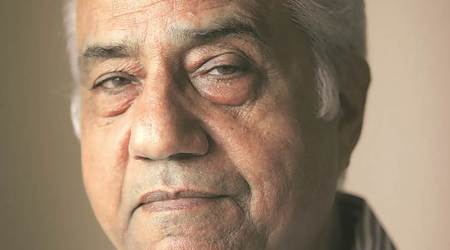 In the A K Gopalan case of 1950, the Supreme Court said Articles 19 and 21 were mutually exclusive — the seven freedoms of Article 19 were not subsumed in the fabric of life or personal liberty in Article 21.
In the A K Gopalan case of 1950, the Supreme Court said Articles 19 and 21 were mutually exclusive — the seven freedoms of Article 19 were not subsumed in the fabric of life or personal liberty in Article 21.
Before a nine-judge Constitution bench of the Supreme Court unanimously declared the right to privacy a fundamental one, the court had taken up the subject many times over the last several decades. While two major verdicts had rejected right to privacy as a fundamental right, several benches had stressed that right. One of these two verdicts was by an eight-judge bench in M P Sharma vs Satish Chandra in 1954 — a judgment subsequently not followed even by several smaller benches. Then in 1964, a six-judge bench ruling on the Kharak Singh case, too, rejected the right to privacy as a fundamental right. Some subsequent benches, however, interpreted that judgment differently.
In PUCL vs Union of India (1997), a case in which the petitioner challenged the constitutional validity of the Indian Telegraph Act, 1885, Justice Kuldip Singh referred to the Kharak Singh case: “Article 21 of the Constitution has, therefore, been interpreted by all the learned judges in Kharak Singh’s case (majority and the minority opinions) to include that ‘right to privacy’ is a part of the right to ‘protection of life and personal liberty’.” This, when the majority judgment in the Kharak Singh case had noted that “the right of privacy is not a guaranteed right under our Constitution.” Thursday’s ruling underlined this interpretation by other benches of the ruling in the Kharak Singh case
Relation between rights
A key issue discussed was the overlapping and complementary character of fundamental rights. In the A K Gopalan case of 1950, the Supreme Court said Articles 19 and 21 were mutually exclusive — the seven freedoms of Article 19 were not subsumed in the fabric of life or personal liberty in Article 21. In subsequent cases, however, the court said these rights complement each other; the new doctrine was firmly established by an 11-judge bench in R C Cooper vs Union of India. Subsequently, the Supreme Court ruled that the expression “personal liberty” in Article 21 covers a variety of rights, some of which “have been raised to the status of distinct fundamental rights” and given additional protection under Article 19. The right to privacy falls under both articles.
“The right to privacy,” Justice D Y Chandrachud wrote on behalf of four judges in the bench Thursday, emanates “from the liberties guaranteed by Article 19 and from the protection of life and personal liberty under Article 21.” Justice A M Sapre noted that the right to privacy emanates from the Preamble, that is “liberty of thought, expression, belief, faith and worship” and “Fraternity assuring the dignity of the individual”, freedoms enshrined under Article 19 and personal liberty under Article 21.
What is privacy
In the PUCL case, the court held that the right to hold a telephone conversation in the privacy of one’s home or office without interference falls under “right to privacy”. In State of Karnataka v Krishnappa, the court expanded the doctrine to include sexual offences against women. “Sexual violence apart from being. dehumanising. is an unlawful intrusion of the right to privacy and sanctity,” it ruled.
In Sharda v Dharmpal, the appellant and respondent were spouses and divorce was sought on medical grounds but the respondent did not want to undergo a medical test. “If the respondent avoids such medical examination on the ground that it violates his/her right to privacy… it may render the very grounds on which divorce is permissible,” the court said. In Suchita Srivastava v Chandigarh Administration, a woman was allegedly raped when she was in a government welfare institution, and had become pregnant. The HC ordered that her pregnancy be terminated but she wanted the child. The SC allowed her to exercise her choice as that “a woman’s right to privacy, dignity and bodily integrity should be respected”.
In Selvi vs State of Karnataka, the court noted that right to privacy is enshrined in Article 20(3), the right against self-incrimination. “The “right to privacy’ should account for its intersection with Article 20(3),” it said. In Ram Jethmalani v Union of India, a division bench dealt with a PIL on unaccounted money. The court held that the revelation of bank account details without a prima facie ground of wrongdoing would be a violation of the account-holders’ right to privacy.
In Lillu vs State of Haryana, the Supreme Court emphasised the right of rape survivors to privacy, physical and mental integrity and dignity. And Thursday, Justice J Chelameswar noted that the right to travel freely within the country or go abroad falls within the right of privacy. “The freedom to choose either to work or not and the freedom to choose the nature of the work are areas of private decision making process,” he wrote, adding that the “choice of appearance and apparel are also aspects of the right of privacy”.
Justice S A Bobde delved into ancient and religious texts: “A woman ought not to be seen by a male stranger seems to be a well-established rule in the Ramayana,” he wrote, adding that “Grihya Sutras prescribe the manner in which one ought to build one’s house in order to protect the privacy of its inmates.”

